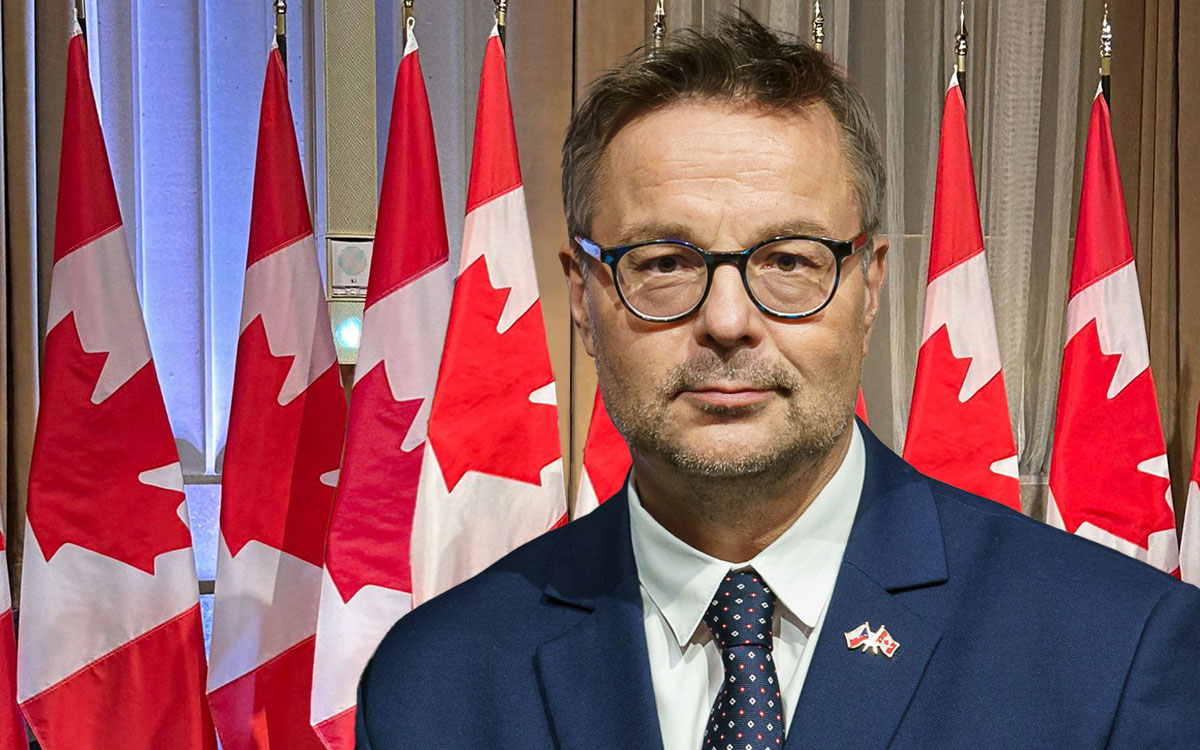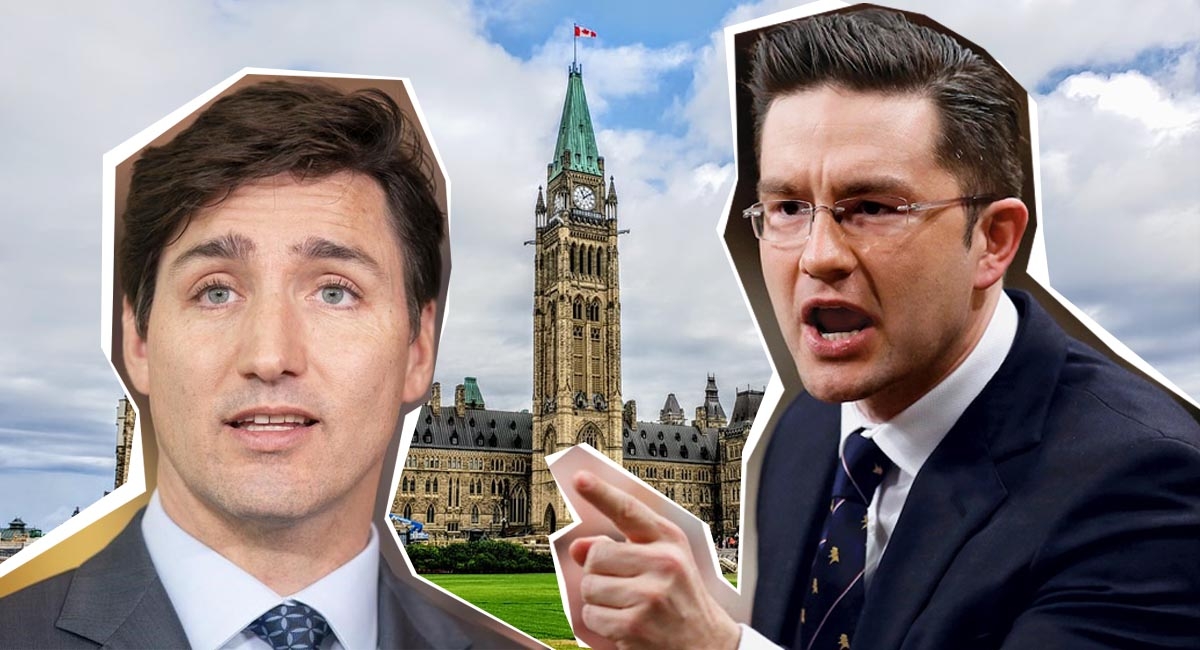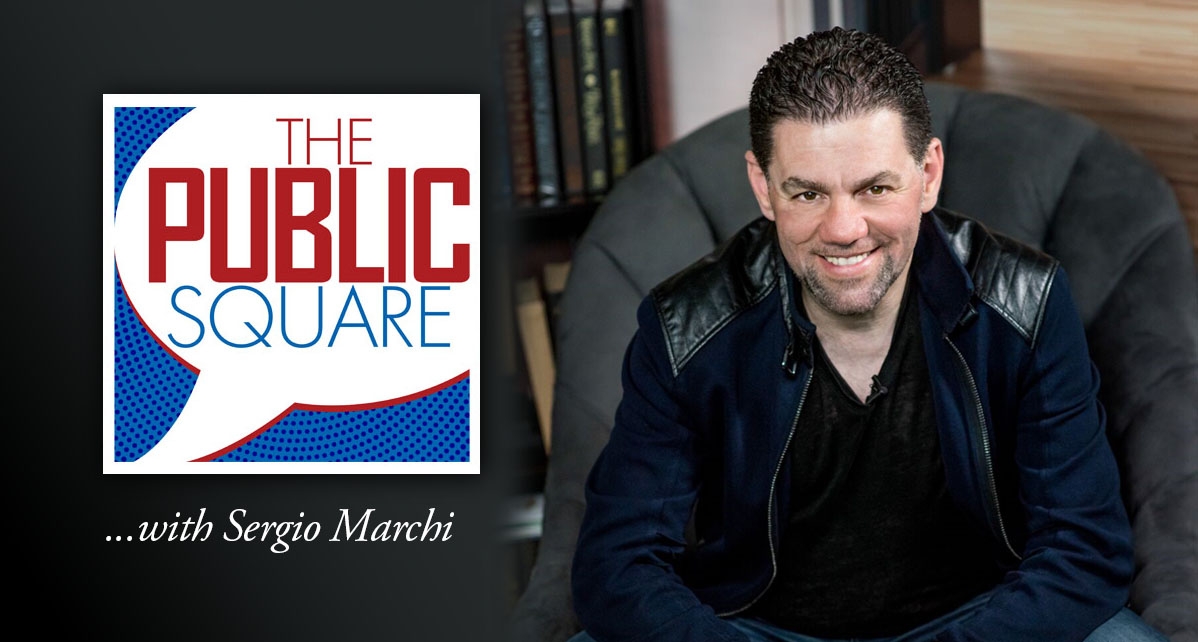
Czech Ambassador Martin Tlapa on Canada Czech Relations, NATO and 2%, Ukraine War and Standing with Israel
“Our independence and spirit for freedom comes from being in the centre of Europe-being occupied and seeing war-because all wars in Europe were going from the South to the North, from the East to the West. Land locked country in the heart of Europe! We often warn others explaining to their diplomats, ’Don’t be too naive. Democracy must be strong and be prepared. That’s why the overall competitiveness and economy for the country is so important.” — Czech Ambassador Martin Tlapa, Ottawa, May 2024
OLM Publisher and Managing Editor Dan Donovan met last week with the Ambassador of the Czech Republic to Canada, Martin Tlapa. Their conversation covered the Czech history and diaspora in Canada, Canada-Czech affairs, NATO’s expectations regarding member nations meeting their two percent commitments (highlighting Canada’s historical shortfall in this regard), the ongoing war in Ukraine, and Czechia’s steadfast support for Jewish communities and Israel during the Gaza conflict.
OLM: This is your second posting to Canada. You served at the Canadian Embassy in Ottawa three decades ago as a young foreign service officer.
Ambassador Tlapa: I love Canada. It is a wonderful place with so much to offer. I was posted to the embassy here in Ottawa earlier in my career, between 1992 and 1996. I immediately felt at home here. Canadians and Czechs share many common values and have similar sensibilities. I really like Ottawa, in the winter too (LOL), and I was thrilled to return as ambassador. Canada is a second home for me, for sure.
OLM: How is the current state of bilateral relations between Canada and the Czech Republic? Could you elaborate on the areas where you perceive the greatest potential for strengthening ties, as well as the specific priorities and initiatives you are currently focusing on to enhance collaboration between our two nations?”
Ambassador Tlapa: Canada and Czechia have excellent relations, and we do a lot of things together. Canadian imports from the Czech Republic are over $1 billion Canadian, and over 70 thousand Canadian tourists visit Czechia annually. I do not need to repair relations or anything like that, but I do think there are more areas for cooperation in the future. I see an enormous potential for Czech-Canadian mutually beneficial cooperation in sectors such as research and development, including through the Horizon Europe program, university education, cybersecurity, and the nuclear energy sector, and both our countries are highly advanced in aerospace. There is room for our bilateral trade and investments under the CETA agreement.
I would like to see more students young Czechs and Canadians taking advantage of the existing Youth Mobility Agreement. This program gives people between 18 and 35 years a wonderful opportunity to study, work, or simply rest and enjoy each other country’s culture for a whole year, thanks to a special visa programme.
The Czech Republic offers an incredible amount of historical heritage and Canadian nature is simply irresistible for Czechs. Finally, I see potential for cooperation on global and regional issues, such as supporting peace, stability, and economic development in our partner countries in Eastern Europe, Africa, and the Indo-Pacific. Canada-based, Czech-owned Colt produces arms supporting Ukrainians facing Russian aggression, and Canada’s contribution to the Czech initiative to purchase ammunition for Ukraine are the two recent examples.
OLM: Many Czechs immigrated to Canada and are part of the story of the settlement and growth of Canada as a nation.
Ambassador Tlapa: Czechs have immigrated to Canada in different periods over the past century and a half. Because of this, there are strong ties and deep bonds between our countries. At the end of the 19th century (1880’s -1900), there was significant immigration to Canada, primarily from regions of Bohemia and Moravia. They settled in rural areas of the Prairies mostly in Manitoba, Saskatchewan, and Alberta, which reminded them of home and where they established successful farming communities.
Shortly after the end of WW1, thousands of Czech soldiers from the Czechoslovak Legions, which controlled a substantial part of Siberia at the time, were transferred from Russia back to Europe across the Americas with the support of our Allies, Canada, and the U.S. and some of the soldiers decided to settle in Canada. Between WW1 and WW2, immigration slowed, but political unrest in Europe in the 1930s (with the rise of the Nazis) led many people to migrate to Canada and the United States.
After World War II, there was another wave of Czech immigration to Canada, with many individuals and families fleeing the Soviet communist regime and occupation established in Czechoslovakia during the communist putsch in 1948. And finally, thousands fled to Canada after the Soviet invasion in 1968 and during the following 20 years of Soviet occupation of our country. These Czechs sought refuge in Canada because of the shared values, a love of country, peace, and the opportunity to work and have prosperity. One hundred thousand Canadians currently identify as of Czech origin.
So yes, Czech immigrants have made significant contributions to Canada’s cultural community, business community, agriculture sector, academia, and the arts.
OLM: There are several famous Czech Canadians.
Ambassador Tlapa: Many Canadians will recognise the names of some notable Canadians of Czech ancestry like the famous shoe magnate Tomáš J. Baťa, Olympic swimmer Alex Baumann, former Olympic Champion figure skater, politician and Ambassador Otto Jelinek, journalist Hana Gartner, jazz singer Dianna Krall and of course, Ottawa resident and famous humanitarian Lotta Hitschmanová, founder of the Unitarian Service Committee of Canada.
OLM: Of course, there are also the famous hockey players too.
Ambassador Tlapa: Well, of course. The Boston Bruins have forward David Pastrnak. He is the active points leader among Czech players, Filip Hronek for the Vancouver Canucks, Martin Necas with the Carolina Hurricanes, Tomas Hertl with the Golden Knights, and many others. Of course, Canadians will also know of Jaromir Jagr—one of the greatest NHL players of all time.
OLM: Czech businesses have had remarkable success in Canada, too.
Ambassador Tlapa: Well, let’s start with beer (laughs). Czechvar lager and Pilsner Urquell Brewery have made their mark in Canada and have been here for decades. Another Czech brewery that has found success in Canada is Dalešice Brewery, which offers a variety of traditional Czech beers to Canadian consumers.
Several companies from Czechia (formerly Czechoslovakia) have been in Canada for decades—many as far back as 1945. A current Czech initiative “Lion & Leaf” is an innovative partnership that promotes Czech expertise, innovation, and collaboration. It’s focused on creating strategic partnerships between Czech companies and Canadian businesses in several sectors, including technology, manufacturing, healthcare, and renewable energy.
For example, Avast is a leading provider of cybersecurity solutions that continues to have significant success in Canada. It’s the same for Tatra, off-road 8×8 trucks, who cater to Canadian niche markets in mining, forestry, and transportation. Aero Vodochody Aerospace supplies aircraft components and services to Canadian aviation companies. Litostroj, from the Czech energy group Energo-Pro ČEZ, Group is a major energy company with operations in Canada, supplying turbines for hydroelectricity generation and distribution. Colt Canada is nowadays part of the Colt CZ Group, a global defence group with a Czech background, supplying defence forces of many NATO countries. WIKOV, a Czech designer and manufacturer of industrial gearboxes, provides solutions for the Canadian renewable energy sector, such as tidal and hydrogen.
Several of the Czech companies supply vital components to the Canadian railway sector, from railway tracks by Třinecké železárny to railway bogies and wheels by GHH-Bonatrans. Škoda Group supplies the North American market, including iconic trolleybuses, to San Francisco. Linet, the Czech market leader in the EU, supplies advanced hospital beds to Canadian ICUs, clinics, and hospitals. Draslovka, the traditional Czech chemical producer, has recently teamed up with Barrick and introduced a ground-breaking innovative technology for Canadian mining—the use of glycine, a non-toxic, recyclable, and edible amino acid to recover gold, copper, nickel, and cobalt, allows for 80 percent reduction in cyanide use. It is great news for Canadian nature.
On the consumer side, Rock Empire has gained a foothold in the Canadian market, providing high-quality gear for outdoor enthusiasts and there is the popular Kofola soft drink from Czechia that has successfully introduced its products to Canadian consumers. Czech GZ Media, a global leader in the manufacturing of vinyl records for music labels and artists, opened its production facility in Ontario.
OLM: I’d like to switch to some of the geopolitical problems Canada and Czechia are facing, including the war in Ukraine and the war in Gaza. Czechs are no stranger to invasions. In the last century, your country was occupied by both the Nazis and the Soviet troops from Russia. I recall, as a young child, my father talking about the Czech uprising—the Velvet Revolution. Later, as a young adult, I remember the Velvet Revolution after the collapse of the Soviet Union. Can you comment on these events?
Ambassador Tlapa: Yes, the Czech people do not forget these things. The Prague Spring uprising, an attempt to introduce liberal reforms in Czechoslovakia, was led by Alexander Dubček. It started in January 1968, and after only a couple of months, in August 1968, the reform process was crushed by an occupation of Czechoslovakia led by the Russians. It’s estimated that around 140 Czechs and Slovaks were killed directly by Soviet troops, and approximately five hundred were wounded. During this period, thousands of Czechoslovak citizens managed to flee to Western countries, seeking asylum and refuge from the repressive Soviet (Russian) regime following the invasion. The Czech people know war and the tragedy of war. We hate, we despise, war. We love freedom, and this is why we strongly support Ukraine and NATO against the Russian invasion. People have the right to live freely in peace.
(*Editor’s note: Alexander Dubček was a prominent figure in Czech politics, particularly renowned for his role as the leader of the Czechoslovak Communist Party during the Prague Spring of 1968. He advocated for political liberalisation and reforms aimed at democratising Czechoslovakia’s communist system, which led to a brief period of increased freedom of speech, press, and movement within the country. Dubček’s leadership during this time symbolised a hopeful departure from the rigid control of the Soviet Union. However, his efforts were short-lived, as Soviet forces invaded Czechoslovakia in August 1968, crushing the Prague Spring and ending Dubček’s reformist agenda. Despite the suppression of his reforms, Dubček remains an important figure in Czech history, symbolising the aspirations for freedom and democracy during a tumultuous period of Cold War politics).
OLM: What about the post-Soviet changes in the 1990s and the emergence of Václav Havel, who led the Velvet Revolution?
*Editor’s note: Václav Havel was a prominent Czech playwright, dissident, and political activist who played a central role in the Velvet Revolution, a nonviolent transition of power in Czechoslovakia that occurred in November and December 1989. It began as a series of peaceful protests and demonstrations against the authoritarian Communist regime led by the Communist Party of Czechoslovakia, which had been in power since 1948. The protests were fuelled by a desire for political freedom, human rights, and democratic reforms.
Ambassador Tlapa: Yes, well, Václav Havel was an important and influential man of visions who pressed for political changes through civil disobedience and peaceful resistance. His leadership of the opposition movement had widespread support, which led to the resignation of the Communist government. In December 1989, Havel was elected as the President of Czechoslovakia by the Federal Assembly, a new era of democracy and freedom for us. The Velvet Revolution was a significant moment in modern Czech history and is symbolic for us as it shows the triumph of democracy and the people over totalitarianism. Yes, it is possible!
*Editor’s note: When Václav Havel visited Canada in 1994, he emphasised to then-Prime Minister Jean Chretien that Canada, the West, and other democracies must always remember the suffering caused by totalitarian regimes and the need to safeguard democratic values. Havel also expressed gratitude for the support Canada provided to Czechoslovakia during its transition to democracy after the fall of communism.
OLM: With the Russian invasion of Ukraine in February 2022 and the current war in GAZA that was started by the extremist group Hamas, do you think Canada and the West are learning from past lessons in terms of how we deal with security and villainous states?
Ambassador Tlapa: The Soviet Era and occupation are not so far back. Yet the Russians are on the move again in Ukraine. Czech citizens know the lessons of history. Our independence and spirit for freedom come from being in the centre of Europe—of being occupied and seeing war—because all wars, those going from the South to the North and those from the East to the West, end up in our land-locked country in the heart of Europe! We often warn others, explaining to their diplomats, Don’t be too naive, and democracy must be strong and be prepared. That’s why the overall competitiveness and economy of the country are so important.
OLM: Canada, like Czechia, is a member of NATO. The Trudeau government has been criticised by the United States and other NATO countries for not meeting its NATO commitment of spending two percent of its GDP on defence in support of the alliance and is now being further criticised regarding its tepid spending in support of the NATO effort in Ukraine.
Ambassador Tlapa: Russia cannot win in Ukraine. This is a very dangerous situation. Czechia supports NATO and Ukraine, and we are providing a two per cent threshold regarding defence for NATO and for our own country’s security. In Europe, you may see that most countries now are having (to spend) two percent of GDP on defence, including Czechia. Canada is an important member of NATO, and it is hopeful that Canada will see the importance of meeting its two percent defence obligation for NATO as we move ahead. Ukraine, with NATO support, is counting on Czechia, Canada, and other democracies to help them protect their country and people from Russian incursion and invasion. Czechia is committed to NATO, and I am sure Canada is too. If Russia thinks they can do this to Ukraine, they will do it elsewhere, so we are in the moment to speak and act.
OLM: After two years of war in Ukraine, it is reported that there are over 600,000 dead soldiers and civilians on both sides. Many Canadians are asking the question, how does this end? In February 2023, Chinese Foreign Minister Qin Gang proposed a 12-point plan to end the Russia-Ukraine war. Ukrainian President Volodymyr Zelenskyy referred to the Chinese effort as an important first step and said, “I think that, in general, the fact that China started talking about peace in Ukraine, I think that it is not bad. It is important for us that all states are on our side, on the side of justice.” However, fighting has continued for another year. Last month, Chinese President Xi Jinping proposed a second initiative- four principles to achieve peace between Russia and Ukraine. Ukraine responded with its 10-point peace plan for ending its war against Russia, which includes calls for a cease-fire and restoration of Ukraine’s territory to Kyiv’s control, including the Crimean Peninsula.
What do you think is the endgame in Ukraine?
Ambassador Tlapa: Russia cannot invade a sovereign country and take over its territory. Every negotiated solution must be based on Ukraine’s terms. The EU, on its side, provides economic, humanitarian, and military support for Ukraine, in total worth over €88 billion since Russia’s invasion, with the 50 billion Euro package agreed upon in February. The recent U.S. Congress support of a $61-billion military support package to help Ukraine fight this war shows the resolve of the USA and NATO. Hopefully, this will lead the Russians to realise NATO and Ukraine EU are willing to defend and determined to continue supporting Ukraine as long as it takes.
OLM: Israel was attacked on October 7th by Hamas terrorists who brutalised and killed over 1,200 people, including foreign nationals. Israel then declared war on Hamas. Since then, a strange thing has happened here in Canada, in the United States and even in Europe, where the Jewish people feel that they are under attack because they are Jewish. This ugly head of antisemitism has reared itself in our streets and in other places.
Ambassador Tlapa: Yes. I have watched this unfold in Canada and elsewhere, and it is troubling. The Czech people have seen this type of aggression and evil against Jewish people play out in the past in Europe and under the Nazis. We believe we must confront it. This is why, in the Czech education system, students learn about our history and about the holocaust, and they know of the horrors of all of this. The Czech government stands with Israel and the right of the Israeli people to defend themselves.








